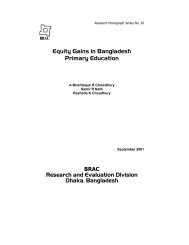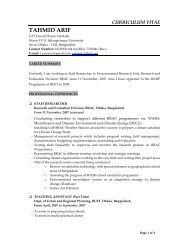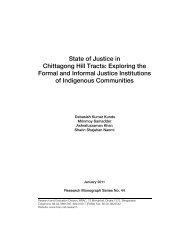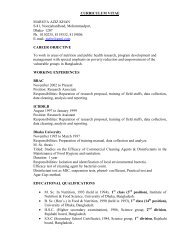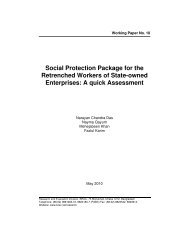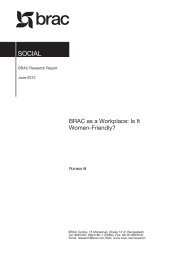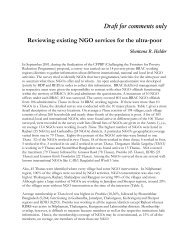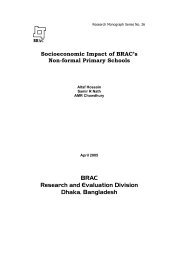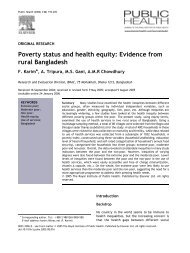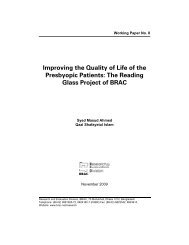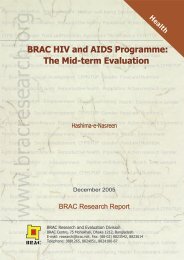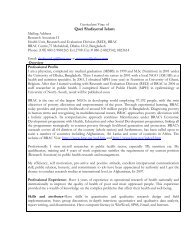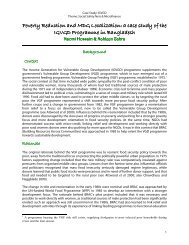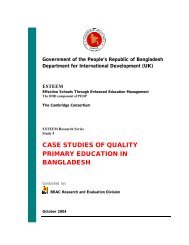Combining health and social protection measures to reach the ultra ...
Combining health and social protection measures to reach the ultra ...
Combining health and social protection measures to reach the ultra ...
You also want an ePaper? Increase the reach of your titles
YUMPU automatically turns print PDFs into web optimized ePapers that Google loves.
Access <strong>to</strong> <strong>health</strong><br />
<strong>and</strong> conference statements requires states <strong>to</strong> actually meet an<br />
individual’s water requirements.<br />
Global <strong>health</strong>: <strong>the</strong> way forward<br />
Global <strong>health</strong> research addresses <strong>the</strong> ways in which<br />
globalization is impacting on both <strong>health</strong> determinants <strong>and</strong><br />
outcomes 1 . This is a ra<strong>the</strong>r new, but very exciting research<br />
field. The small number of persons, groups <strong>and</strong> institutions<br />
that is tackling this <strong>to</strong>pic is steadily growing. A next step in<br />
this evolution of interest is <strong>the</strong> recognition that much of <strong>the</strong><br />
research needs <strong>to</strong> be conducted within a systems context.<br />
Global processes, <strong>and</strong> <strong>the</strong>ir <strong>health</strong> impacts, do not occur in<br />
isolation. Many of <strong>the</strong> modifications of, for example,<br />
infectious disease transmission, lifestyles, <strong>health</strong> care, or food<br />
security are <strong>the</strong> result of coexistent <strong>and</strong> often interacting<br />
developments. The discussed framework provides valuable<br />
insights in how <strong>to</strong> organize <strong>the</strong> various fac<strong>to</strong>rs involved in<br />
addressing global <strong>health</strong>. It clearly demonstrates that an<br />
integrated approach is needed, drawing upon <strong>the</strong> knowledge<br />
from relevant fields such as epidemiology, sociology, political<br />
sciences, (<strong>health</strong>) education, environmental sciences <strong>and</strong><br />
economics. We need <strong>to</strong> step away from business-as-usual<br />
attitudes, sec<strong>to</strong>ral-based solutions <strong>and</strong> short-term remedies.<br />
This will require integrated initiatives organized around <strong>the</strong><br />
<strong>health</strong> challenges posed by globalization ra<strong>the</strong>r than around<br />
specific research disciplines or policy sec<strong>to</strong>rs.<br />
Additionally, global <strong>health</strong> should concern everybody’s<br />
<strong>health</strong>. The SARS outbreak demonstrated that when an<br />
epidemic threats <strong>the</strong> affluent countries, <strong>the</strong> response is fast<br />
<strong>and</strong> well-funded 70 . The current lists of global <strong>health</strong> priorities<br />
primarily focuses on selected conditions around infectious<br />
diseases (e.g. HIV/AIDS, malaria <strong>and</strong> tuberculosis), reflecting<br />
<strong>health</strong>-related problems in <strong>the</strong> developing world that are<br />
perceived <strong>to</strong> threaten <strong>the</strong> vital interests of industrialized<br />
countries 71 . This illustrates <strong>the</strong> existing inequalities in power<br />
over agenda-setting on global <strong>health</strong>, with “dominant<br />
interests framed as globally shared” 1 . We need more research<br />
addressing <strong>the</strong> complex linkages between global processes<br />
<strong>and</strong> <strong>the</strong> multiple disease burdens in <strong>the</strong> developing world. As<br />
<strong>the</strong> geographic scale of important communicable <strong>and</strong> noncommunicable<br />
<strong>health</strong> issues increases, countries are<br />
progressively dependent on each o<strong>the</strong>r in establishing good<br />
<strong>health</strong>. Exploring <strong>the</strong> impacts of globalization requires<br />
capacity building in developing regions <strong>and</strong> transborder<br />
collaborations between scientists, policy-makers, <strong>and</strong> o<strong>the</strong>r<br />
stakeholders. Global <strong>health</strong> should be inherently concerned<br />
with reducing <strong>the</strong> burden of disease in populations<br />
worldwide, <strong>and</strong>, consequently, with narrowing <strong>the</strong> 10/90 gap<br />
<strong>and</strong> streng<strong>the</strong>ning research capacity in low-income countries.<br />
Additionally, priority setting should not only consider current<br />
disease burdens <strong>and</strong> inequities, but must also anticipate<br />
possible global <strong>health</strong> challenges in <strong>the</strong> future. ❏<br />
Maud MTE Huynen currently works at <strong>the</strong> International Centre<br />
for Integrated assessment <strong>and</strong> Sustainable development (ICIS) at<br />
Maastricht University. She holds a master’s degree in<br />
Environmental Health Science <strong>and</strong> Epidemiology from Maastricht<br />
University. Her current PhD research explores future <strong>health</strong> in a<br />
globalizing world. She also works on several o<strong>the</strong>r projects<br />
exploring <strong>the</strong> <strong>health</strong> impacts of global environmental change. In<br />
2001–2002, she was <strong>the</strong> Assistant Edi<strong>to</strong>r of <strong>the</strong> international<br />
journal Global Change <strong>and</strong> Human Health. At <strong>the</strong> moment, she is<br />
a member of <strong>the</strong> edi<strong>to</strong>rial board of <strong>the</strong> international journal<br />
Globalization <strong>and</strong> Health. After finalizing her PhD <strong>the</strong>sis, she will<br />
continue working at ICIS as a research fellow on <strong>to</strong>pics related <strong>to</strong><br />
global <strong>and</strong> environmental <strong>health</strong>.<br />
Pim Martens is Direc<strong>to</strong>r of <strong>the</strong> International Centre for Integrated<br />
Assessment <strong>and</strong> Sustainable development (ICIS), Maastricht<br />
University, where he holds <strong>the</strong> Chair in “Sustainable<br />
Development”. Professor Martens is project-leader <strong>and</strong> principal<br />
investiga<strong>to</strong>r of several projects related <strong>to</strong> sustainable development,<br />
globalization, environmental change <strong>and</strong> society, funded by, among<br />
o<strong>the</strong>rs, <strong>the</strong> Dutch National Research Programme, <strong>the</strong> United<br />
Nations Environment Programme <strong>and</strong> <strong>the</strong> European Community.<br />
He is Executive Edi<strong>to</strong>r of <strong>the</strong> International Forum on Science <strong>and</strong><br />
Technology for Sustainability, <strong>and</strong> co-edi<strong>to</strong>r-in-chief of <strong>the</strong><br />
international journal EcoHealth. Finally, Professor Martens is a<br />
Fulbright New Century Scholar within <strong>the</strong> programme “Health in a<br />
Borderless World” <strong>and</strong> winner of <strong>the</strong> Friedrich Wilhelm Bessel-<br />
Forschungspreis.<br />
Henk BM Hilderink is Project Leader at <strong>the</strong> Ne<strong>the</strong>rl<strong>and</strong>s<br />
Environmental Assessment Agency (MNP) of <strong>the</strong> project “Global<br />
Integrated Sustainability Model (GISMO)” in which various facets<br />
of sustainable development are modelled, positioned <strong>and</strong><br />
analyzed. His research focus is on population <strong>and</strong> <strong>health</strong> modelling<br />
at various geographical scales. He is <strong>the</strong> author of <strong>the</strong> book World<br />
Population in Transition <strong>and</strong> co-author <strong>and</strong> project leader of <strong>the</strong><br />
project “Long-term population <strong>and</strong> household scenarios for <strong>the</strong><br />
Ne<strong>the</strong>rl<strong>and</strong>s”. He is a board member of <strong>the</strong> Dutch Society of<br />
Demography (NVD) <strong>and</strong> <strong>the</strong> Population-Environment Research<br />
Network (PERN). He holds a master’s degree in ma<strong>the</strong>matics from<br />
<strong>the</strong> University of Nijmegen <strong>and</strong> a PhD in demography from <strong>the</strong><br />
University of Groningen.<br />
072✜ Global Forum Update on Research for Health Volume 4



